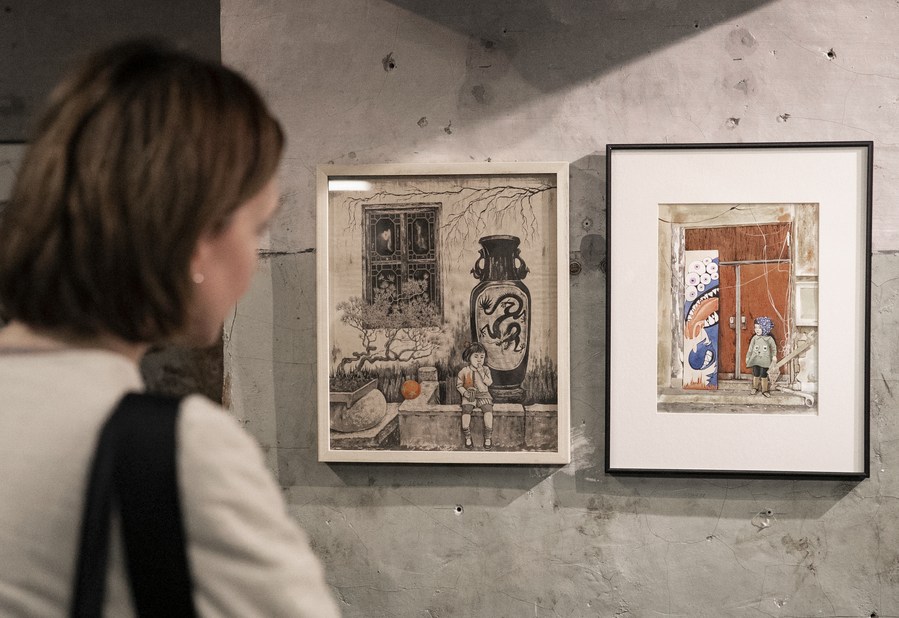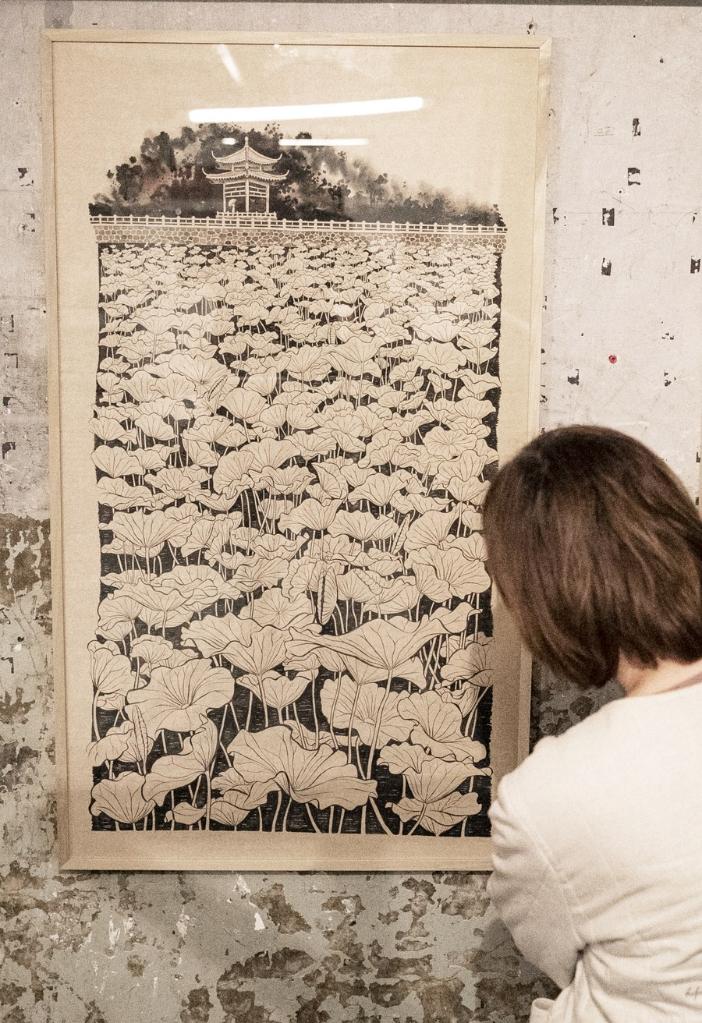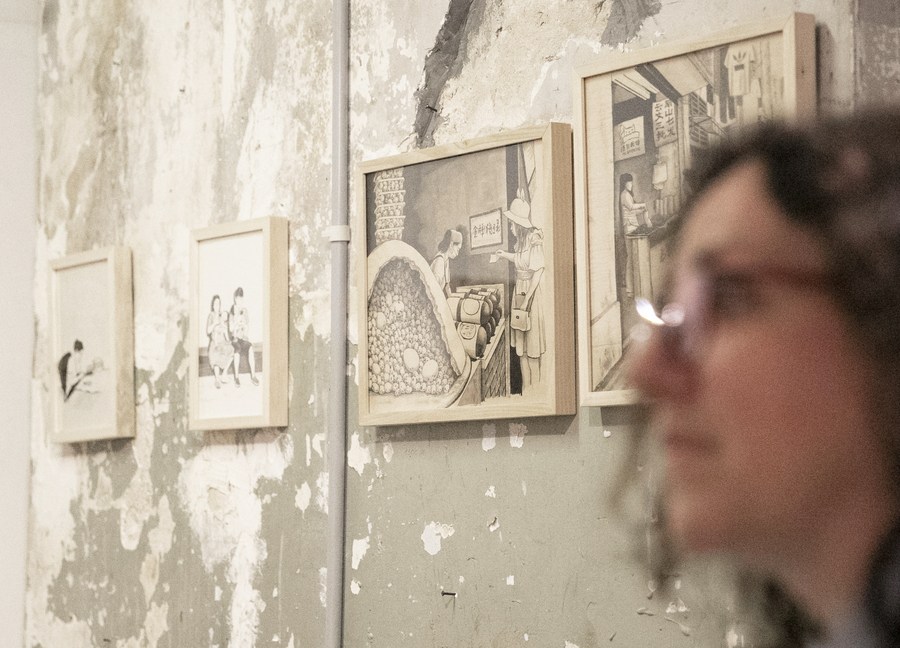
A visitor observes paintings at the exhibition "The train Tel Aviv-Shanghai" in Tel Aviv, Israel on March 31, 2023. (Xinhua/Chen Junqing)
JERUSALEM, April 15 -- Walking into the Abraham Hostel in downtown Tel Aviv, you will find an industrial-style underground gallery, decorated with artistic paintings about China and Israel.
For Israeli artist Sveta Dorosheva, the exhibition is like a vehicle bound for Shanghai, loaded with her love for the Chinese metropolis.
Themed "The train Tel Aviv-Shanghai departs from Abraham Hostel," the exhibition consists of three parts: "Life in Shanghai" is about Sveta's stay in Shanghai, "Life in Tel Aviv" is a personal project carried out over a decade about her as an immigrant in Israel, and a series of surreal-looking illustrations.

A visitor observes paintings at the exhibition "The train Tel Aviv-Shanghai" in Tel Aviv, Israel on March 31, 2023. (Xinhua/Chen Junqing)
Although the month-long exhibition ended on Saturday, Dorosheva said her crush for Shanghai will linger.
Back in the summer of 2018, Dorosheva was invited to Shanghai to participate in an art project, where contemporary artists from around the world gathered together.
Living in one of the most famous cities in China for three months, she found herself submerged in a sea of overwhelming emotions, which became inspirations for her future realism-based artistic pieces.
Bustling streets, dazzling skyscrapers, and the convenient and comfortable way of life in terms of fast delivery and cashless payment are mind-blowing to those who visited Shanghai for the first time, including Dorosheva.
"In Shanghai, I found that the reality around me was so fantastic that I didn't really want to mix it with anything my feeble imagination could offer. So I just drew the reality of what I have seen in Shanghai as a foreigner," Dorosheva told Xinhua.
In the Shanghai series of the exhibition, there are pieces illustrating old people chatting around the corner, stylish young pedestrians holding shopping bags, deliverymen in a rush, and ladies dressed in traditional Han Fu cosplay costumes. The scenes commonly seen in Chinese cities are incorporated with artistic beauty by Dorosheva.
Recalling her first painting created in Shanghai, Dorosheva said she had planned to use watercolors, but when she went to Fuzhou Road, reputed as the Cultural Street of Shanghai, the wide variety of Chinese painting tools took her breath away. "I would spend all my money," she said.
The encounter with traditional Chinese painting inspired Dorosheva to embark on a new journey of creative arts. During her stay in Shanghai, she finished a total of 15 paintings and continued to draw another 15 pieces after leaving the city, all on Chinese Xuan papers and done with a brush dipped in black ink and colored pigments, just like traditional Chinese paintings.

A visitor observes paintings at the exhibition "The train Tel Aviv-Shanghai" in Tel Aviv, Israel on March 31, 2023. (Xinhua/Chen Junqing)
Not far from the Shanghai series are paintings of the Tel Aviv series drawn by Dorochova in watercolors. Although the two series adopt different tools and techniques, they are both based on life scenes of ordinary people, seeking to describe the most authentic parts of human beings.
"I just thought I don't have to invent anything, and I don't have to be creative. I can approach it as raw reality," she noted, adding that as an immigrant herself, she feels Tel Aviv and Shanghai brought her similar feelings.
Ira Krokhmal, the curator of the exhibition, told Xinhua that she had never been to Shanghai, yet was well aware that people always compare Shanghai to Tel Aviv because both are national economic centers full of modern vitality.
Besides painting, Dorosheva published a book featuring her wonderful stay in Shanghai in her mother tongue Russian, so as to make her Shanghai memory more complete and diverse.
"In Shanghai, she grapples with two new realities, not one: that of the flamboyant, unimaginable Shanghai, and the extravagant, impenetrable world of contemporary art," read the synopsis of the book.
Yana Gorelik, a Russian-Israeli who came to the exhibition after reading the book, said that Shanghai is depicted in the book as modernity, prosperity, and full of human kindness.
"It is my dream since childhood to come to visit the beautiful country. Now I see how she sees it. I think it's much more than I have imagined, and I would like to come to see China by myself," she said.











